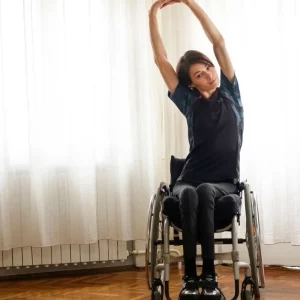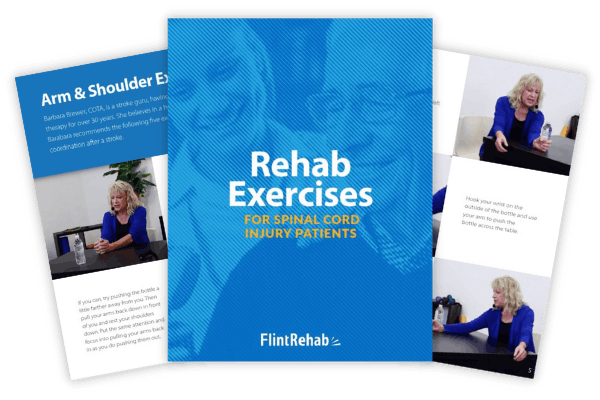While a spinal cord injury directly affects motor control and sensation, individuals may also experience secondary psychological effects.
Psychological changes after spinal cord injury can affect a person’s motivation, personality, and energy levels. Without proper management, these changes can hinder one’s ability to pursue rehabilitation and negatively impact recovery outcomes.
To help you better understand the psychological effects of spinal cord injury, this article will discuss:
- Factors that can affect mental health after spinal cord injury
- Psychological effects of spinal cord injury
- How to manage the psychological effects of SCI
Factors That Can Affect Mental Health After Spinal Cord Injury
Life after spinal cord injury may require significant lifestyle changes, which may cause psychological distress. Additionally, complications of spinal cord injury can cause individuals to feel a lack of control over their lives, which can foster negative thinking.
By identifying what is causing changes in one’s mental health status, individuals can get the personalized help they need to successfully overcome negative behaviors and improve their quality of life.
Common Factors Leading to Psychological Changes After Spinal Cord Injury
Some of the most common factors leading to psychological changes after spinal cord injury include:
- Chronic pain. Pain can negatively affect your mood and make it difficult to move or focus.
- Impaired mobility. Paralysis/weakness may make it more difficult for you to participate in your favorite activities, at least initially.
- Lack of independence. Having to rely on others more frequently because you can’t use the bathroom or eat on your own, for example, can take a toll on your mental health.
- Medications. Many people are prescribed strong painkillers after SCI that affect the way the brain functions. Similarly, they can become addictive, so they are not ideal for long-term use.
- Poor diet. What foods you eat and the frequency of your meals can affect your energy levels, performance, and mood.
- Substance use. High-stress situations can lead a lot of people to turn to alcohol or other substances for comfort. While they might provide temporary relief, substances can impair judgment and cause emotional instability.
- Physical inactivity. Physical inactivity will lead to poor circulation, reduced metabolic rate, and increased risk of injury.
- Poor sleep quality. Secondary effects of SCI such as chronic pain and respiratory complications can disrupt sleep. Lack of sleep is associated with low energy levels, increased irritability, and reduced alertness.
- Financial problems. Some individuals with spinal cord injuries may have trouble getting their insurance to cover their treatments or may be unable to return to their jobs due to their motor impairments.
- Traumatic brain injury. If a traumatic event causes TBI along with your SCI, individuals may experience cognitive impairments that affect personality and behavior.
- Isolation. Feeling lonely and misunderstood can trigger negative thinking.
Fortunately, most of these factors can be treated, avoided, or adapted to minimize the burden on daily life. Now that you understand what factors can contribute to psychological changes after spinal cord injury, let’s explore the potential outcomes that may occur.
Psychological Effects of Spinal Cord Injury

Every individual experiences spinal cord injury and its secondary complications differently. Therefore, the psychological effects of SCI can vary from mild to severe and have unique effects on one’s quality of life.
Below, we’ll discuss 4 common psychological effects of spinal cord injury and their symptoms. As you’ll see, many symptoms of these conditions overlap. If you suspect that you may have any of these mental health disorders, consult with a mental health professional for an official diagnosis and appropriate treatment.
1. Depression
Depression is one of the most prevalent psychological effects of spinal cord injury. In fact, the estimated incidence of depression after spinal cord injury is 11-37%.
A complex interplay of biological, psychological, and social factors causes mood disorders, such as depression. Often, chemical imbalances in the brain contribute to depression; however, difficulties adjusting to life after SCI can also trigger it. For example, individuals with severe paralysis may not be able to perform self-care tasks on their own and need to depend on a caregiver. For some, the loss of autonomy and increased dependence can significantly affect their mental health.
Symptoms of depression after spinal cord injury include:
- Lack of interest/ motivation/ concentration
- Oversleeping/ under sleeping
- Loss of appetite/ overeating
- Low energy levels
- Feelings of hopelessness
- Thoughts of suicide or self-harm
This study suggests that some individuals are more prone to develop depression after SCI than others. The study found depression occurred more frequently in women, individuals with tetraplegia (paralysis of both the upper and lower body), those with a history of suicide attempts, and those cared for by family members other than their spouse or parents.
Learn more about depression after spinal cord injury »
2. Anxiety
Another common psychological effect of spinal cord injury is anxiety. An estimated 15-32% of individuals develop anxiety after SCI.
Symptoms of anxiety following spinal cord injury include:
- Restlessness/ excessive worry or fear
- Irritability
- Sleep deprivation
- Panic attacks (heart pounding, difficulty breathing, sweating, stomach in knots)
Anxiety generally develops as a result of uncertainty about the future or feeling incapable of self-care. Feelings of excessive worry or fear can trigger avoidant behaviors and lead to social withdrawal.
3. Post-Traumatic Stress Disorder
Following a traumatic spinal cord injury, individuals may develop post-traumatic stress disorder (PTSD).
Symptoms of PTSD after spinal cord injury include:
- Negativity
- Self-destructive behavior
- Emotional numbness
- Flashbacks/ dreams of the traumatic event
- Hypervigilance
- Difficulties sleeping
- Avoidance
While it is common for individuals to report these symptoms initially after their injury, continuing to experience them past 1 month generally warrants a diagnosis of PTSD.
4. Chronic Fatigue
Chronic fatigue after spinal cord injury can be overwhelming and is closely linked to decreased quality of life. It is associated with a combination of physical, psychological, and age-related factors.
Chronic fatigue often results from the notion that individuals aren’t able to do things as easily as they did prior to injury. The constant comparison of life before and after spinal cord injury can be a significant source of distress.
Many individuals may feel discouraged from or unable to be physically active due to their motor impairments. However, the body can get accustomed to reduced physical activity and muscles can atrophy (waste away), which can make it even more tiring to move around.
Symptoms of chronic fatigue after spinal cord injury include:
- Low energy
- Lack of motivation
- Constantly tired despite getting adequate sleep
- Frustration
The greatest levels of fatigue are reported amongst younger individuals and those who have not had SCI for very long. Generally, as time goes by and individuals learn more effective ways to cope and improve their mobility, symptoms of chronic fatigue are reduced.
In the following section, we’ll discuss how to manage psychological effects of spinal cord injury to improve your quality of life.
Managing Psychological Effects of Spinal Cord Injury

Failure to address the psychological effects of spinal cord injury can interfere with rehabilitation efforts and slow down recovery. Psychological management interventions generally focus on improving one’s perceived sense of control and purpose, as well as promoting a positive mindset.
Management interventions for the psychological effects of spinal cord injury may include:
- Medications. Generally, the medications prescribed for managing mental health problems after spinal cord injury, like antidepressants, can help to regulate the neurotransmitter levels in your brain responsible for mood, deep sleep, appetite, focus, and reward perception.
- Increasing physical activity. Exercise is crucial for improving circulation and getting oxygen to the brain. When you exercise, your body releases neurotransmitters that can help boost your mood, alertness, motivation, and relieve pain.
- Adjusting your diet. What you eat can significantly affect your mental health. This analysis found that diets high in fruit, vegetables, whole grains, low-fat dairy, fish, olive oil, and antioxidants were associated with a decreased risk of depression. In contrast, a diet high in red or processed meats, sweets, high-fat dairy products, refined grains, and low in fruits and vegetables was associated with an increased risk of depression.
- Participating in psychotherapy. A psychotherapist can help guide your thoughts, identify the root of your problems, and suggest effective coping mechanisms. Psychotherapy focuses on helping you understand your behaviors and generally provides a more long-term solution for managing mental distress.
- Joining support groups. Joining a spinal cord injury support group allows you to meet other individuals with SCIs. By sharing experiences, you can help one another cope and be aware of potential challenges you may face in the future. Additionally, support groups promote a sense of belonging and help individuals feel cared for, which helps reduce feelings of social isolation. There are also support groups for family members of those with SCIs, which could help your family members to better support and care for you.
- Surrounding yourself with loved ones. Surrounding yourself with friends and family will help keep your spirits high during this difficult adjustment time.
These management interventions can help individuals learn effective ways to cope after spinal cord injury.
Psychological Effects of Spinal Cord Injury: Key Points
Spinal cord injury recovery is both a physiological and psychological challenge. While damage to the spinal cord does not directly affect psychological states, the resulting motor and sensory impairments can contribute to changes in mental health.
Without proper treatment, psychological complications can cause individuals to develop harmful and avoidant behaviors. This can significantly affect their relationships with others and contribute to more severe mood disorders.
We hope this article helped you understand how an SCI can affect your mental health. If you’re experiencing symptoms of any of the conditions mentioned in this article, consult with a mental health professional so you can get the help you need.











